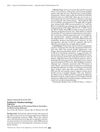 December 2024 in “Revista Eletrônica Perspectivas da Ciência e Tecnologia - ISSN 1984-5693”
December 2024 in “Revista Eletrônica Perspectivas da Ciência e Tecnologia - ISSN 1984-5693” Polymeric nanoparticles could improve hair loss treatments by delivering drugs more effectively to hair follicles.
 July 2024 in “Forum Dermatologicum”
July 2024 in “Forum Dermatologicum” Topical treatments for hair loss can be effective but need careful safety evaluation.
June 2024 in “Journal of Drug Delivery Science and Technology” Nanocarrier-based treatments show promise for better hair growth in androgenetic alopecia but need more research.
 March 2024 in “Case Reports in Dermatology”
March 2024 in “Case Reports in Dermatology” A woman's hair loss was misdiagnosed as alopecia areata but was actually lichen planopilaris, needing immediate and ongoing treatment.
 February 2024 in “Biomedicines”
February 2024 in “Biomedicines” Hormones like androgens, estrogen, thyroid hormones, and stress hormones can contribute to hair loss, and treatments target these hormonal imbalances.
 February 2024 in “Actas Dermo-Sifiliográficas”
February 2024 in “Actas Dermo-Sifiliográficas” Dermatologists recommend oral dutasteride for male hair loss, low-dose oral minoxidil for female hair loss, and a multidisciplinary approach for young patients, with caution during pregnancy.
 January 2024 in “Journal of Cosmetic Dermatology”
January 2024 in “Journal of Cosmetic Dermatology” Microneedling combined with other treatments significantly improves hair growth in people with hair loss and is safe.
 January 2024 in “Pharmacy information”
January 2024 in “Pharmacy information” New treatments using stem cells and other methods show promise for promoting hair growth in androgenetic alopecia.
 December 2023 in “Farmateka”
December 2023 in “Farmateka” Minoxidil is an effective and safe treatment for common hair loss when applied to the skin, but more research is needed for optimal use.
December 2023 in “̒Ulūm-i dārūyī” New treatments for excessive hair growth in women, including advanced drugs and nanotechnology, show promise for better results.
 November 2023 in “Australasian journal of dermatology”
November 2023 in “Australasian journal of dermatology” Dermatologists are essential in helping transgender and gender diverse patients with skin and hair issues related to gender affirmation and hormone therapy.
 September 2023 in “Forum Dermatologicum”
September 2023 in “Forum Dermatologicum” Various treatments for common hair loss in men and women are effective, but should be tailored to individual needs and potential side effects.
 August 2023 in “Journal of The American Academy of Dermatology”
August 2023 in “Journal of The American Academy of Dermatology” New treatments for hair loss include low-dose pills, updated drugs, supplements, light therapy, plasma injections, and advanced hair transplant techniques.

People on Reddit generally have positive opinions about hair loss treatments.
 July 2023 in “Journal of exploratory research in pharmacology”
July 2023 in “Journal of exploratory research in pharmacology” A new psoriasis lotion called "Psorisbye" improved symptoms in a patient within one week.
 June 2023 in “Brazilian Journal of Health Review”
June 2023 in “Brazilian Journal of Health Review” Common baldness is a hereditary condition that can be treated with medications or surgery to prevent progression and improve self-esteem.
May 2023 in “Journal of Cosmetic and Laser Therapy” Using multiple treatments together works better for female hair loss than using one treatment alone.

There are many treatments for common hair loss, but more trials are needed to decide which are best.
 May 2023 in “Journal of drugs in dermatology”
May 2023 in “Journal of drugs in dermatology” Most transgender patients getting laser hair removal before gender-affirming surgery are already on hormone therapy, which might affect the hair removal process.
 April 2023 in “Dermatologica Sinica”
April 2023 in “Dermatologica Sinica” Sex hormones affect hair growth and loss, and treatments for related hair diseases include various medications, hair transplantation, and light therapy.
 December 2022 in “OBG Management”
December 2022 in “OBG Management” The conclusion is to diagnose PCOS with just hyperandrogenism and irregular periods, and treat with lifestyle changes and basic medications.
 December 2022 in “International Journal of Women's Dermatology”
December 2022 in “International Journal of Women's Dermatology” The Sinclair Shedding Scale is effective for diagnosing Alopecia Areata Incognita and monitoring treatment success.
 November 2022 in “Journal of the Endocrine Society”
November 2022 in “Journal of the Endocrine Society” An 8-year-old boy's early puberty was caused by a rare hormone-secreting brain tumor, which was successfully treated with surgery.

Polycystic ovary syndrome (PCOS) affects about 10% of women, is often linked to obesity and family history, and can cause irregular periods, fertility issues, and other symptoms. It's usually managed with lifestyle changes, weight loss, and medication.
January 2022 in “Dubai diabetes and endocrinology journal/Dubai diabetes & endocrinology journal” A 16-year-old girl with HAIR-AN syndrome was treated with lifestyle changes and medications to manage her condition.
 April 2021 in “Advances in Cosmetic Surgery”
April 2021 in “Advances in Cosmetic Surgery” Hair restoration can be achieved through non-surgical treatments like minoxidil, antiandrogens, phototherapy, and PRP procedures, or through surgical methods like hair transplantation. Continued treatment is needed to maintain results, and full results are visible after 12-18 months.

The review found that PRP is the most effective treatment for hair loss with few side effects.
 October 2020 in “Проблемы эндокринологии”
October 2020 in “Проблемы эндокринологии” Men with higher androgen levels may have severe COVID-19 symptoms, but those on antiandrogen therapy are less likely to contract the virus and have milder symptoms. Anti-androgen drugs could potentially treat COVID-19, but more research is needed.
 April 2020 in “Journal of the Endocrine Society”
April 2020 in “Journal of the Endocrine Society” Non-classic congenital adrenal hyperplasia (NCCAH) can mimic PCOS and requires genetic testing for proper diagnosis and treatment.
December 2019 in “Orvostudományi Értesítö” Lifestyle changes, medications, and fertility treatments can improve PCOS symptoms and prevent complications.

























